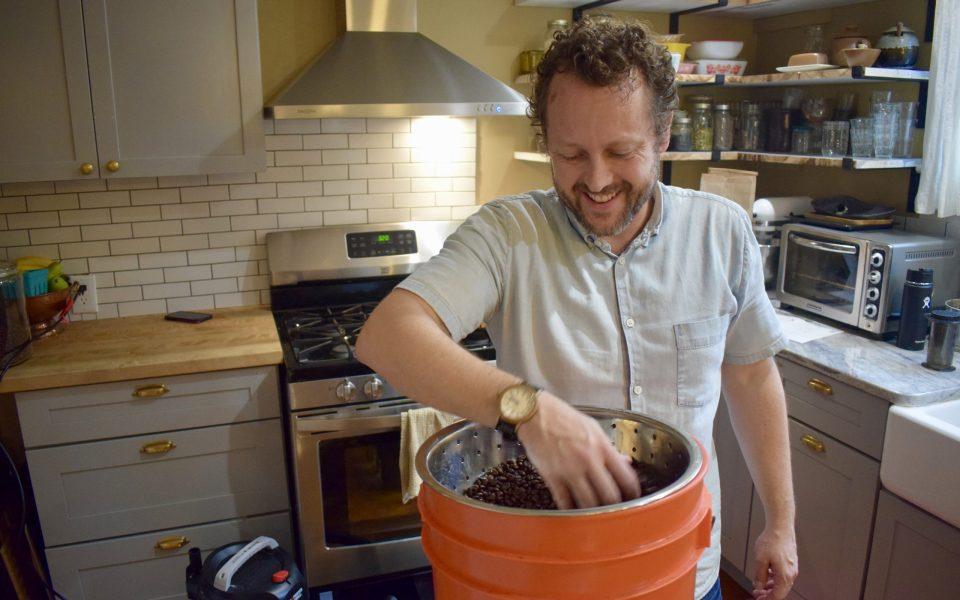Fireweed is more than just a cool name for a coffee company.
“Fireweed is a wildflower that grows in volcanic ash that basically breaks up all the sediment and re-neutralizes the earth so other things can grow,” Wess Daniels, a small-batch, single-origin coffee roaster in Greensboro, says.
“Our friend Seth Martin is a folk singer from near Mount St. Helen’s…and has a beautiful song called ‘Fireweed Mountain’ that’s up on the site and he would talk about fireweed as an agent of healing… and I just love that,” Daniels continues. “When I was thinking about the coffee, I wanted a name that had some depth of meaning to it. I think about fireweed a lot and how I can be more like fireweed in my own life. Plus, it connects us back to our time in the Northwest, which is where I learned to roast coffee and became a coffee nerd.”
His journey to nerd-dom began humbly. As a first-generation college student, Daniels worked his way through school at his stepfather’s doughnut shop.
“It was great to have the job but I had to be there at 3 in the morning, and so I started to drink coffee because I needed to survive,” Daniels says. “It was just diner coffee. Lots of cream, lots of sugar, totally doctored up. But that was my start… and I’ve always loved coffeeshop spaces. I feel like there’s something about sitting down with someone over a cup of coffee because you know you have that person for the next hour or so. It’s a nice way to connect.”
As a graduate student, he recalls cycling to Pete’s Coffee in Pasadena, Calif., where he would nurse a single cup as long as possible even though the ultra-dark roast didn’t suit his palette. But when he and his wife Emily found themselves in Stumptown Coffee Roasters’ original café in Portland, Ore. on a job search, he had himself a cup that “was like when in the Wizard of Oz everything went from black-and-white to color,” he says. “And I realized what coffee could taste like. That set me on a path to, How can I drink coffee like this all the time?”
The answer, in short: Find it fresh. Daniels says coffee has about the same shelf life as bread and buyers should look for bags that reveal the batch’s roast date. Right now, he sources his beans from Sweet Maria’s in Oakland, Calif., and tends toward Central and South American coffees in personal taste, but it pains him to pick between children, so to speak.

©
“If it’s roasted well and it’s fresh, I just think of it as an adventure,” Daniels says. “I have a Kenyan right now that tastes like drinking a cab[ernet] and I like that it’s something different from what you often see, like blueberries. The beans are coming from different farms so every farm the bean tastes different… which I enjoy. The water, the elevation — all that stuff matters.”
Every step in the coffee bean’s journey influences its taste and aroma. Once harvested, there are two traditional methods to extracting seeds for roasting: a wet process in which the fruit is simply washed off with water, and a natural process of letting the fruit dry out before collecting seeds, which results in a stronger flavor. Today, he’s roasting up a batch of beans extracted using a relatively new process he is still learning about called “black honey.”
“How it was explained to me is they take the skin off but the innards of the fruit stay on and ferments, and then they take it off,” he says.
He opens an unroasted bag, releasing potent fragrance similar to papaya. For this batch, he’s using a stovetop Whirly Pop rigged with temperature gauges for both bean and atmospheric temperature. Now that he’s roasting for others, he scribbles detailed notes as he monitors the beans’ progress.[pullquote]Learn more and place orders at fireweedcoffeeco.com.[/pullquote]
“Because I was just doing it for Emily and I, I was spending as little money on it as possible so it’s very manual,” he says, “But because I’ve been doing it that way for so long, I’ve learned the sight, the sound, the smell, I’ve got that down and I’m ready to upgrade. We’re talking about getting a [serious] roaster because it’s hard to do more than three or four pounds over the stove at a time.”
His arm is feeling weary after the last few days.
The process takes less than 15 minutes, from measuring the beans to swiftly cooling them off in a colander to prevent further roasting. From there, they head to Greensboro’s Corner Farmer’s Market, where marketgoers can buy by the bag or the cup. Otherwise, coffee lovers can order up a French press of his latest brew at the People’s Perk. For Daniels, who teaches Quaker studies classes in Guilford College’s religion department and serves as director of the college’s Friends Center, the micro-roasting venture is primarily a creative outlet; the idea is to experiment and break even.
“I love brewing the coffee, I love drawing on the bags, I love talking with people at the markets; all the parts are fun,” Daniels says. “Who knows what will happen over time… but I want that core creativity and joy to stay for me. As long as that’s there, and people are enjoying the coffee, I’m happy.”
Join the First Amendment Society, a membership that goes directly to funding TCB‘s newsroom.
We believe that reporting can save the world.
The TCB First Amendment Society recognizes the vital role of a free, unfettered press with a bundling of local experiences designed to build community, and unique engagements with our newsroom that will help you understand, and shape, local journalism’s critical role in uplifting the people in our cities.
All revenue goes directly into the newsroom as reporters’ salaries and freelance commissions.


Leave a Reply